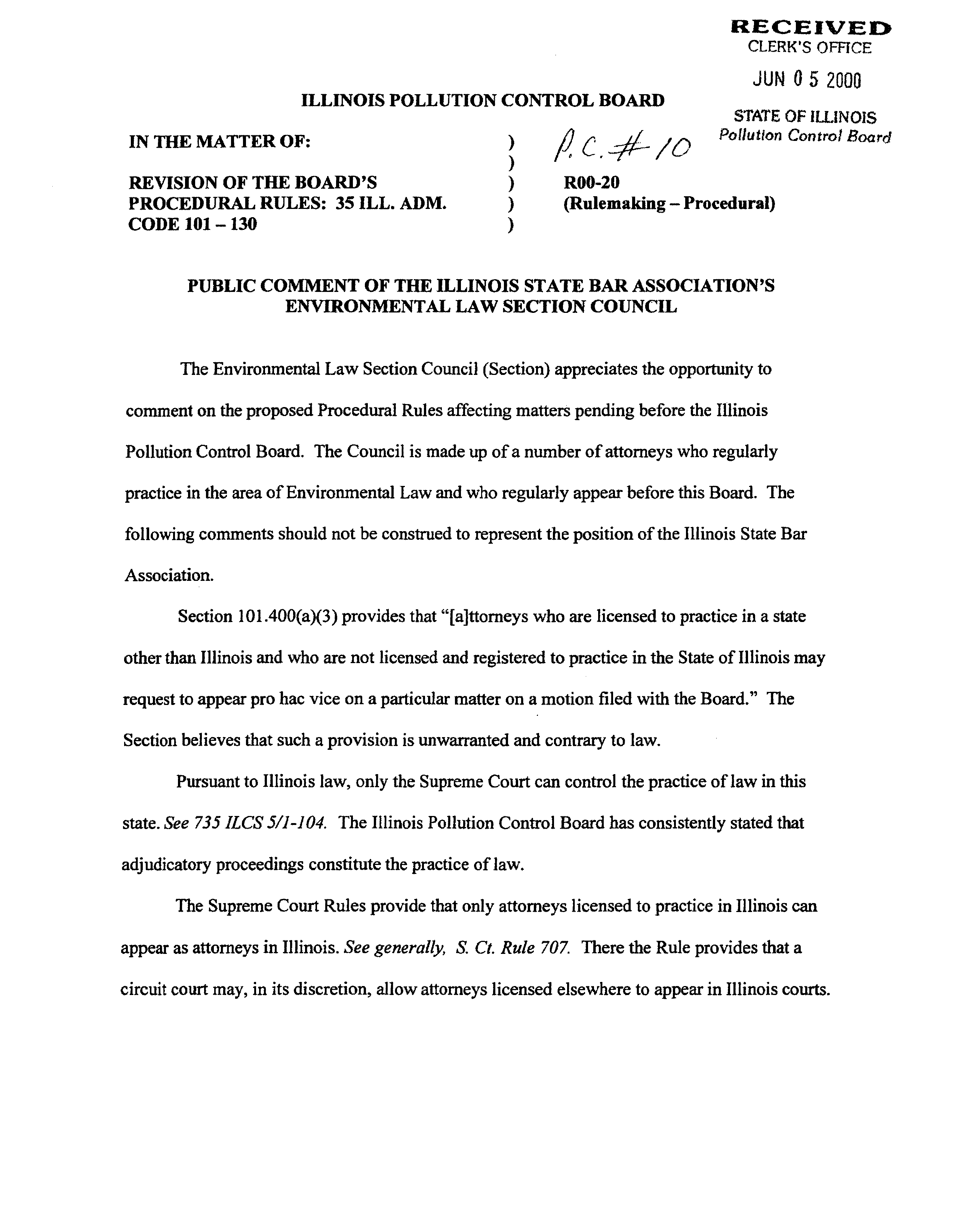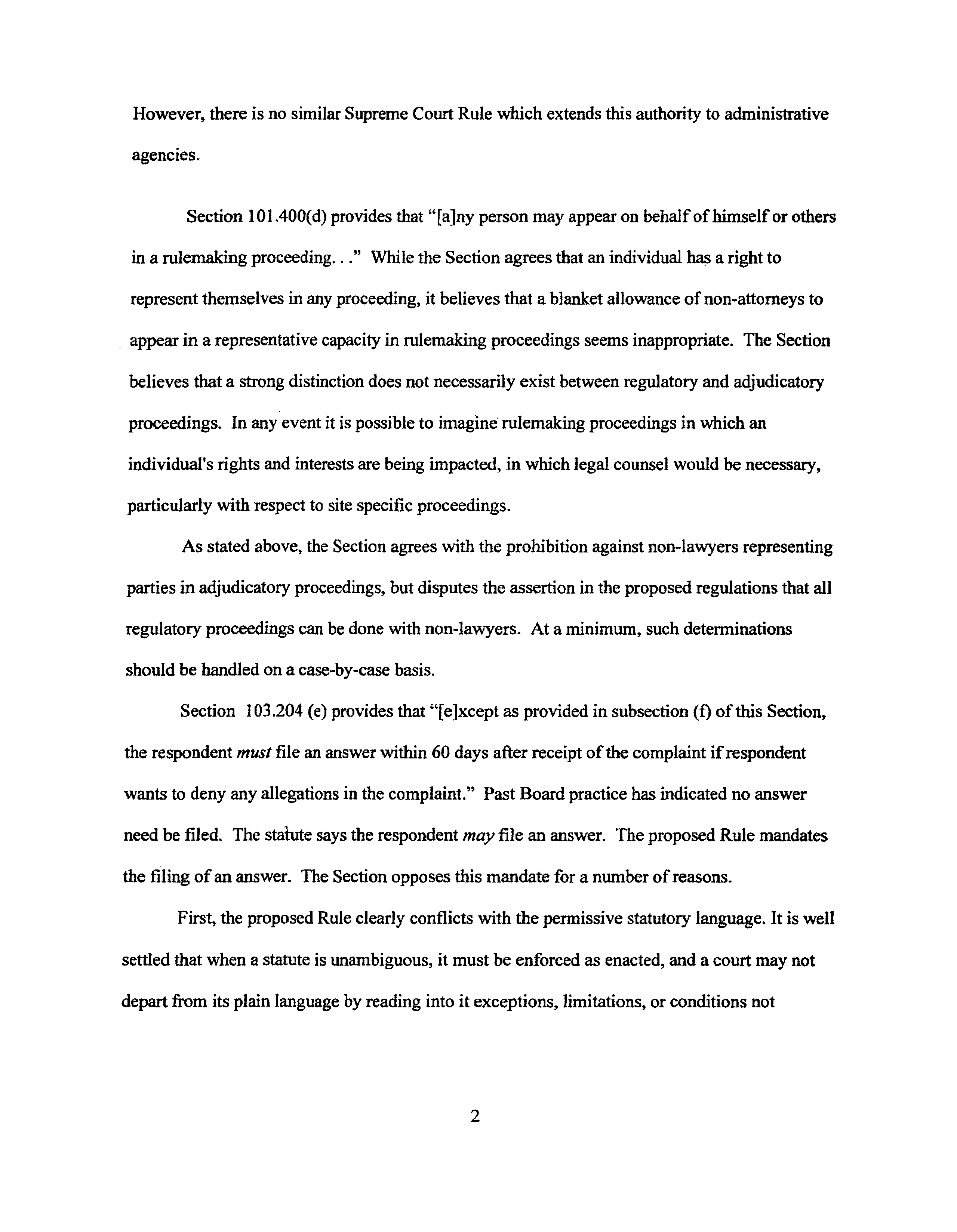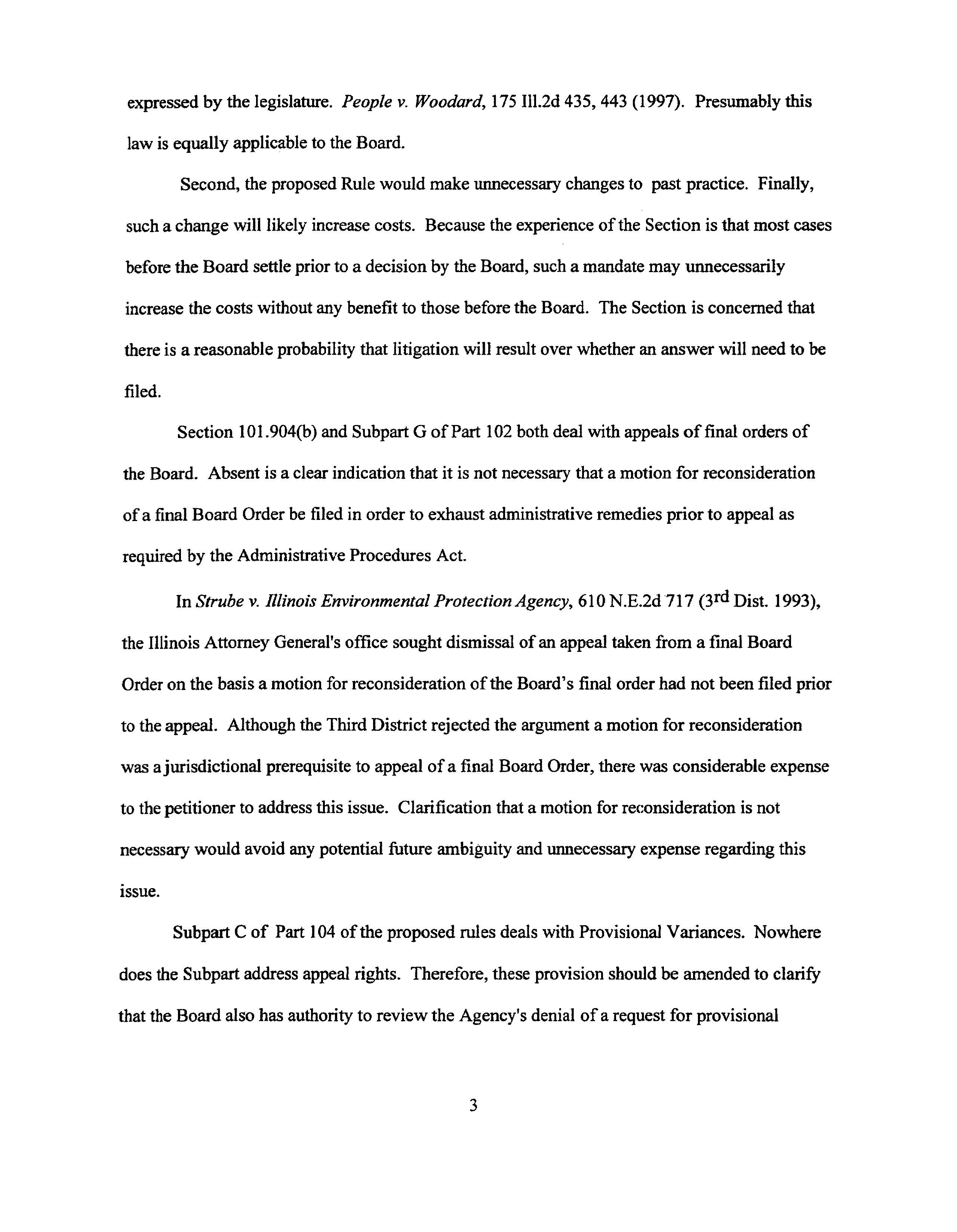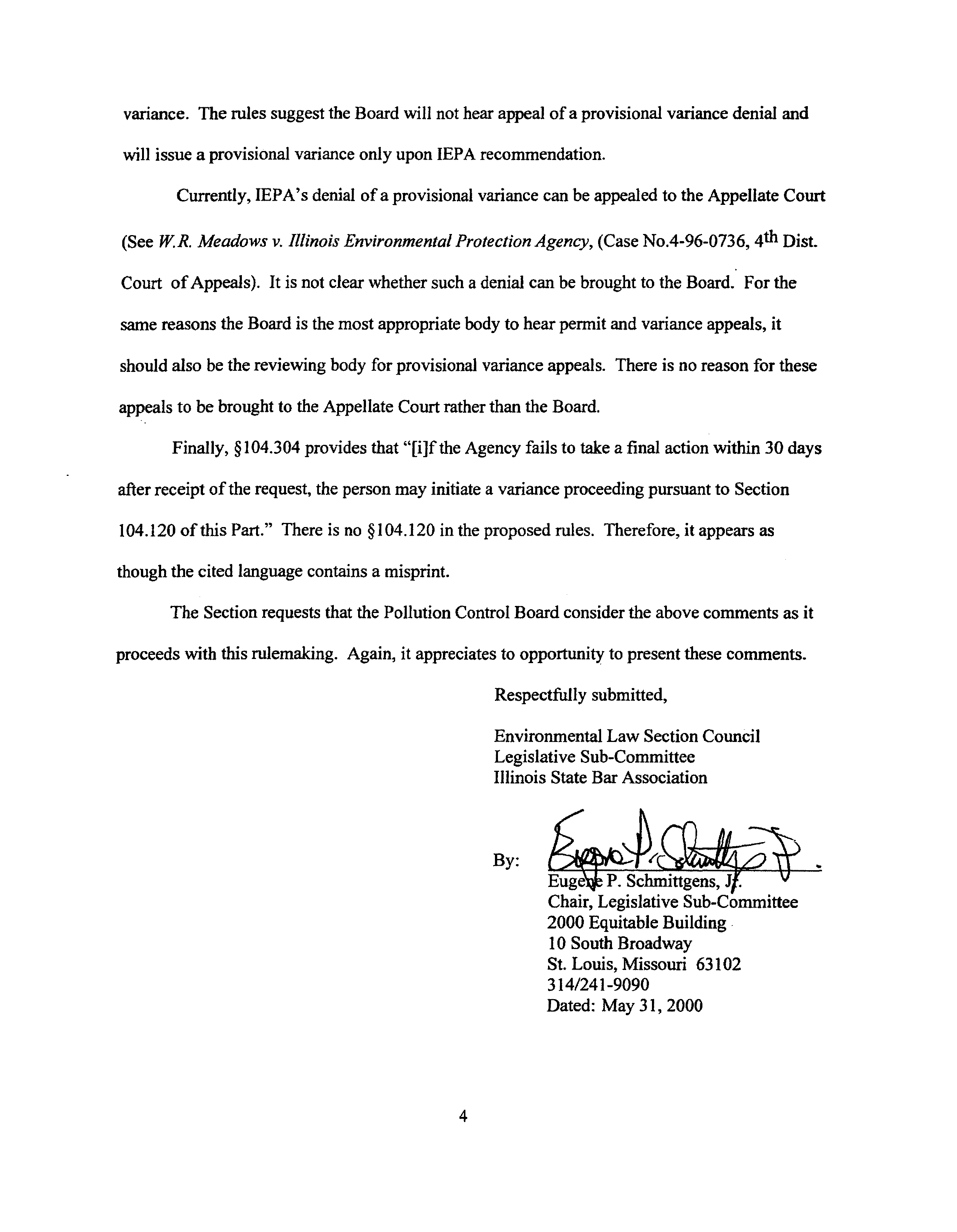RECEIVED
CLERIcS OFFICE
JUN
052000
ILLINOIS POLLUTION CONTROL BOARD
STATE OF IWNOIS
IN
THE
MATTER OF:
)
~O
~
~
/0
Pollution
Control
Board
REVISION OF
THE
BOARD’S
)
R00-20
PROCEDURAL RULES:
35 ILL. ADM.
)
(Rulemaking
-
Procedural)
CODE 101
-
130
)
PUBLIC COMMENT OF
THE
ILLINOIS
STATE
BAR
ASSOCIATION’S
ENVIRONMENTAL
LAW SECTION COUNCIL
The Environmental Law Section Council (Section) appreciates the opportunity to
comment on theproposed Procedural Rules affecting matters pending before the Illinois
Pollution Control Board.
The Council is made up ofa number ofattorneys who regularly
practice in the area ofEnviromnental Law and who regularly appear before this Board.
The
following comments should not be construed to representthe positionofthe Illinois State Bar
Association.
Section
101 .400(aX3) provides that “~attorneys
who are licensed to practice in a state
otherthan Illinois and who are not licensed and registered to practice in the State of Illinois may
request to appear pro hac vice on a particular matter on a motion filed with the Board.”
The
Section believes that such a provision is unwarranted and contrary to law.
Pursuant to Illinois law, only the Supreme Court can control the practice oflaw in this
state.
See 735 ILCS5/1-104.
The Illinois Pollution Control Board has consistently stated that
adjudicatory proceedings constitutethe practice of law.
The Supreme Court Rules provide that only attorneys licensed to practice in Illinois can
appearas attorneys in Illinois.
See generally,
S.
Ci. Rule
707.
There the Rule provides that a
circuit court may, in its discretion, allowattorneys licensed elsewhere to appear in Illinois courts.
However,
there is no similar Supreme Court Rule which extends this authority to administrative
agencies.
Section
101.400(d) provides that “~any
person may appear on behalfofhimself
or
others
in a rulemaking proceeding.
.
.“
While the Section agrees that an individual hasa right to
representthemselves in any proceeding, it believes that a blanket allowance ofnon-attorneys to
appear in a representative capacity in rulemaking proceedings seems inappropriate.
The Section
believes that a strong distinction doesnot necessarily exist between regulatory and adjudicatory
proceedings.
In any event it is possible to imagine rulemaking proceedings in which an
individual’s rights and interests arebeing impacted, in which legal counsel would be necessary,
particularly with respect to site specific proceedings.
As stated above, the Section agrees with the prohibition against non-lawyers representing
parties in adjudicatory proceedings, but disputes the assertion in the proposed regulations that all
regulatory proceedings can be done with non-lawyers.
At a minimum, such determinations
should be handled on a case-by-case basis.
Section
103.204 (e) provides that “~except as provided in subsection (f) ofthis Section,
the respondent
must
file an answer within 60 days afterreceipt ofthe complaint if respondent
wants to deny any allegations in the complaint.”
Past Board practice has indicated no answer
need be filed.
The statute says the respondent
may
file an answer.
The proposed Rule mandates
the filing ofan answer.
The Section opposes this mandate for a number ofreasons.
First, the proposed Rule clearly conflicts with the permissive statutory language. It is well
settled that when a statute is unambiguous, it must be enforced as enacted, and a court may not
departfrom its plain language by reading into it exceptions, limitations, or conditions not
2
expressed by the legislature.
People
v.
Woodard, 175
lll.2d 435,
443 (1997).
Presumably this
law is equally applicable to the Board.
Second, the proposed Rule would make unnecessary changes to
past practice.
Finally,
such a change will likely increase costs.
Because the experience of the Section
is that most cases
before the Board settle prior to a decisionby
theBoard, such a mandate may unnecessarily
increase the costs without any benefit to those before the Board.
The
Section is concerned that
there is a reasonable probability that litigation will result over whether an answer will need to be
filed.
Section
101.904(b) and Subpart G ofPart
102 both deal with appeals offinal orders of
the Board.
Absent is a clear indication that it is not necessary that a motion for reconsideration
ofa final Board Order be filed in order to exhaust administrative remedies prior to appeal as
required by the Administrative Procedures Act.
In
Strube
v. illinois EnvironmentalProtectionAgency,
610 N.E.2d 717
(3rd Dist.
1993),
the Illinois Attorney General’s office sought dismissal ofan appeal
taken from a fmal Board
Order on the basis a motion for reconsideration ofthe Board’s final order had not been filed prior
to theappeal.
Although the Third District rejected the argument a motion for reconsideration
was ajurisdictional prerequisite to appeal of a final Board Order, there was considerable expense
to thepetitioner to address this issue.
Clarification that a motion for reconsideration is not
necessary would avoid any potential future ambiguity and unnecessary expense regarding this
issue.
Subpart C of Part 104
ofthe proposed rules deals with Provisional Variances.
Nowhere
does the Subpart address appeal rights.
Therefore, these provision should be amended to clarify
that the Board also has authority to review the Agency’s denial of a request for provisional
3
variance.
The rules suggest the Board will not hear appeal ofa provisional variance denial and
will
issue a provisional variance only upon IEPA recommendation.
Currently, IEPA’s denial ofa provisional variance can be appealed to the Appellate Court
(See
WR.
Meadows v. illinois Environmental Protection Agency,
(Case No.4-96-0736, 4th
Dist.
Court
ofAppeals).
It is not clear whether such a denial
can be brought to the Board.
For the
same reasons the Board is the most appropriate body to hear permit and variance appeals, it
should also
be the reviewing body for provisional varianceappeals.
There is no reason for these
appeals to be brought to the Appellate Court ratherthan the Board.
Finally,
§
104.304 provides
that “~if the Agency fails to
take a final action within 30 days
after receipt ofthe request, the person may initiate a variance proceeding pursuant to Section
104.120 ofthis Part.”
There is
no
§104.120 in the proposed rules.
Therefore, it appears
as
though the cited language contains a misprint.
The Section requests that the Pollution Control Board considerthe above comments as it
proceedswith this rulemaking.
Again, it appreciates to opportunity to presentthese comments.
Respectfully submitted,
Environmental Law Section Council
Legislative Sub-Committee
Illinois State Bar Association
By:
Euge
P. Schmittgens, J~
Chair, Legislative Sub-Committee
2000 Equitable Building
10 South Broadway
St. Louis, Missouri
63102
314/241-9090
Dated: May 31, 2000
4




